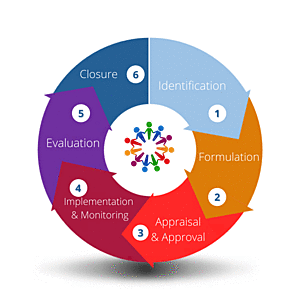FAO welcomed the independent Evaluation of the Technical Cooperation Programme (TCP) which presented its report to Governing Bodies in late 2020. In particular, Management was pleased to note that the Evaluation confirmed the value of the TCP as a vital instrument to support Members in addressing their priority needs, as well as the emphasis throughout the report on the strategic and catalytic use and effects of TCP resources. The evaluation also saw potential to further strengthen the TCP and provided a series of recommendations. Read below how these recommendations have been implemented and what their status is five years after the release of the evaluation report.
Conclusion 1 one of the 2020 TCP Evaluation starts with the sentence: “Overall, if TCP were not there, it should be invented. It is a crucial instrument for FAO’s positioning, visibility and operations in Member Countries.” The evaluation found ample evidence for the effective use of TCP in the period reviewed (2012-2019). Pages 36 to 66 in the main report analyze these findings in detail. In addition, Annex 1 provides 272 examples for the successful use of TCP categorized by type of catalytic effect achieved and income group of the beneficiary countries.
Building on the lessons learned from these examples and an in-depth analysis of existing policies and practices, a number of recommendations were developed to further strengthen the TCP. So how have these recommendations been addressed and what is their status five years after the Evaluation report was released?
The contribution of TCP to the 2030 Agenda and alignment with the FAO Strategic Framework 2022-31 is now documented (see TCP website) and continuously promoted as a key aspect of TCP at senior management and working levels.
Operational guidelines and tools have been updated to support, underline and better document the strategic alignment of TCP. As of 2022, it is possible to report on how TCP expenditures contribute to specific SDG targets, FAO’s four betters and individual Programme Priority Areas (PPAs). The approach and related tools are being developed further as part of the upcoming Corporate Programme and Project Monitoring Framework. | 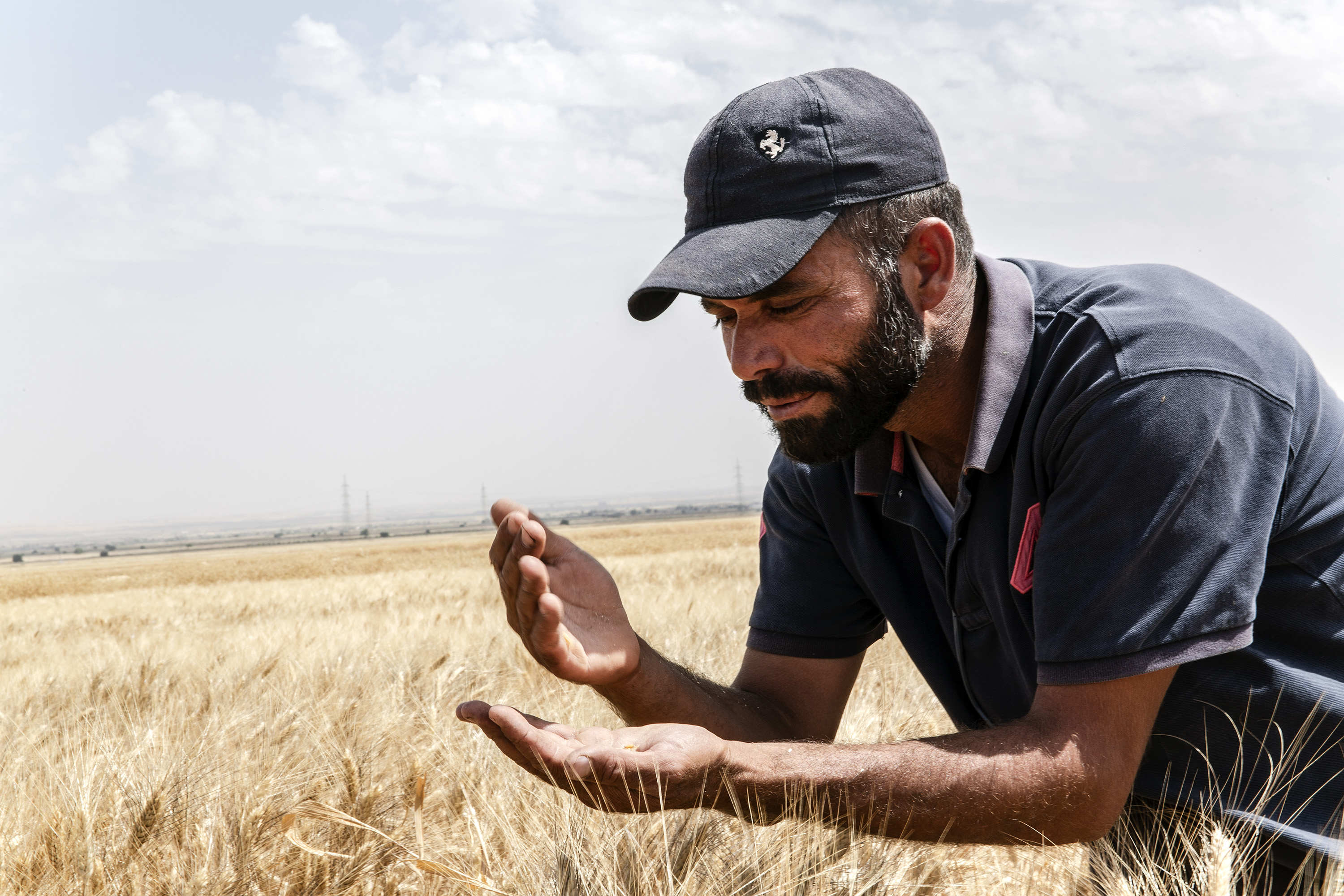 |
| The catalytic role of TCP, in particular for resource mobilization, has been reinforced through strategic communications and fully embraced at management and working levels. Evidence of successes is mounting since systematic collection of results has been institutionalized. It has been established that, since 2018, from an investment of USD 480 million (2 131 projects), the TCP has contributed to the mobilization of USD 6.5 billion for additional support. This is more than 3 times the amount invested in TCP since its creation in the year 1976 (see TCP website for more information). |  |
TCP processes and underlying policies have been drastically simplified while enhancing results-based principles (see recommendation 5). As reported to Governing Bodies (see Programme Implementation Report 2020-21, para 308), efficiency gains achieved by simplifying e.g. the project document and reporting formats, and not handling small TCP projects in the same ways as multi-million USD projects are leading to recurrent staff-time savings of about USD 3.5 million per biennium. Efforts to seek further streamlining in the context of a more programmatic approach to country level activities are under way. As a result of these efforts, and as recorded in the financial status reports of the Organization, we are recording sustained improvements in the overall speed of approval and delivery. These simplifications also played a crucial role during the COVID 19 pandemic. Through adaptive and flexible management approaches, TCP delivery remained on-track despite considerable challenges to FAO’s field operations. | 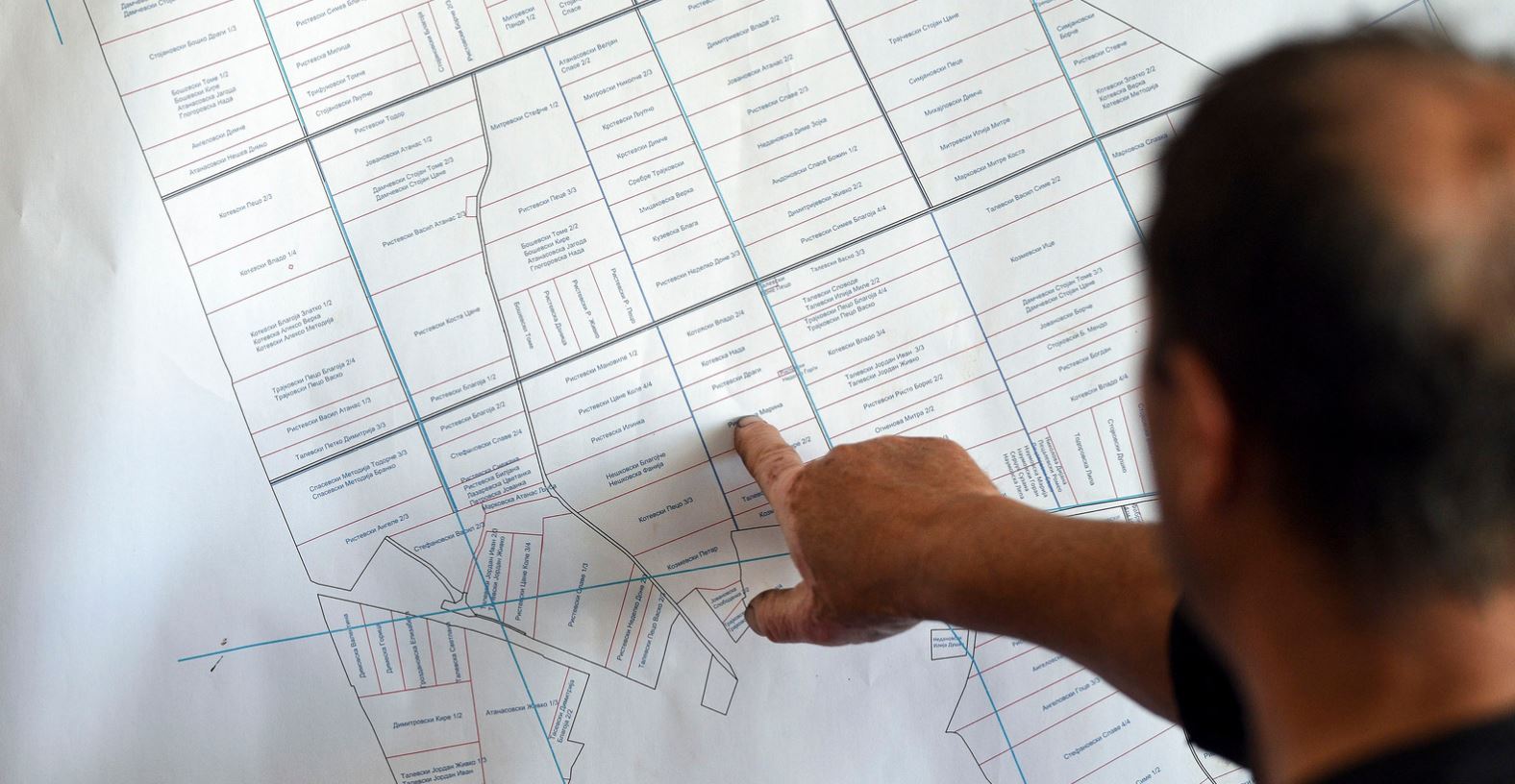 |
The TCP website has become a repository for TCP results, examples for good practices and lessons learned, and is now also an integral part of FAO’s Transparency Portal. The website is continuously being updated and enriched with the latest data extracted from various sources. This includes not only terminal reports and direct follow-up with stakeholders, but also the systematic collection of catalytic effects subsequent to project closure through the Annual Reports of FAO Representatives. In addition, in the framework of country reviews conducted by the Office of Evaluation, a pilot is underway to systematically assess the catalytic outcomes of TCP two years after project closure. The upcoming release of a corporate Programme and Project Monitoring Framework is expected to further enhance and facilitate the systematic documentation of results data. | e13211f0-ed34-4dc6-837f-04274b4b83fa.png?sfvrsn=7c5e29ff_2) |
While procedures and requirements for the approval of TCP projects have been substantially simplified, the support to result-based management and quality project design has been further enhanced. The TCP project document format is now centered around a TCP specific results framework and provides detailed guidance to formulators for its completion. In addition, dedicated programme officers support formulators in quality assurance with special attention to the results chain. Compared to the period reviewed by the TCP evaluation (2012-2019), TCP project design has been significantly improved. In addition, a series of innovative eLearning tools are being released to improve the quality of project design and application of lessons learned. | |
In parallel to the 2020 TCP Evaluation, FAO Governing Bodies initiated a strategic exercise to review the TCP. One of the key aspects of the exercise was the review of how TCP resources are allocated. In close collaboration with Members a new methodology was agreed to determine the regional TCP resource shares. The methodology, applied to resource allocations as of the 2024-25 biennium, is based on a set of criteria including the number of countries in each region and SDG derived indicators establishing comparative levels of need and vulnerability. For the distribution of resources within a region, a harmonized set of principles were developed in close collaboration with the responsible regional management teams. A set of tools and corporate dashboards allows for the transparent monitoring of TCP project approvals and status of implementation. | _8daa7cc2-7844-45da-91f6-e4ab6ef28e10.png?sfvrsn=bcbcf124_2) |
A seventh recommendation considered that FAO Governing Bodies may increase the budget allocated to TCP if above recommendations were implemented. Members, through FAO’s Finance Committee, have recently advocated again for an increase of the TCP appropriation to 17 percent of FAO’s regular programme budget.
Publications
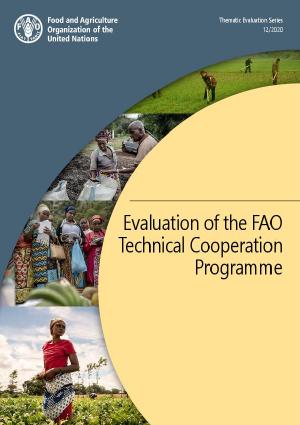
2020 TCP Evaluation
01/01/2020
At its 127th session, the Programme Committee asked the Office of Evaluation (OED) to conduct a comprehensive assessment of FAO’s Technical Cooperation Programme (TCP) to evaluate its relevance, effectiveness and efficiency, fund allocation and distribution, governance and management...
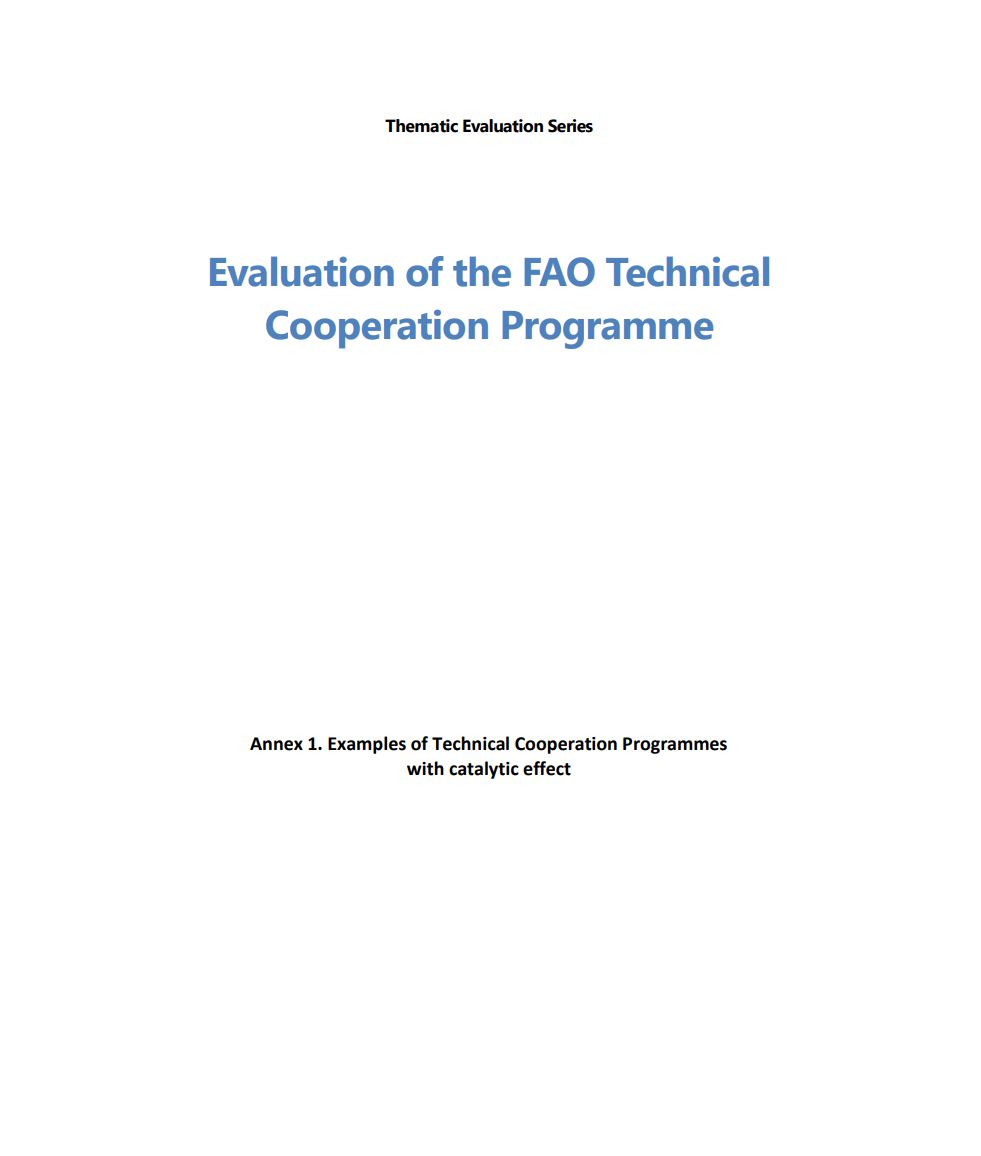
Annex 1 - Examples of TCP with catalytic effect
01/01/2020
272 examples for the successful use of TCP categorized by type of catalytic effect achieved and income group of the beneficiary countries.
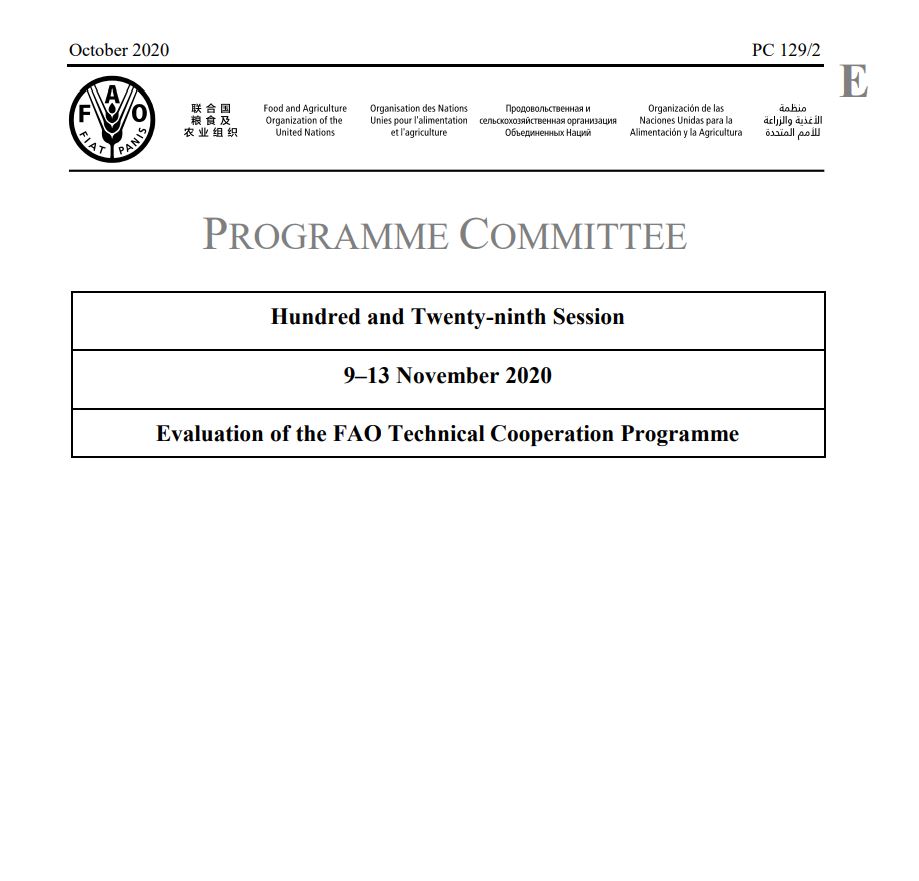
2020 TCP Evaluation (shorter FAO Programme Committee version)
09/11/2020
The evaluation assesses TCP activities at global, regional and national level, including development and emergency TCPs, Technical Cooperation Programme Facility (TCPF) projects and inter[1]regional TCPs. It covers the period from 2012–13 to 2018–19.
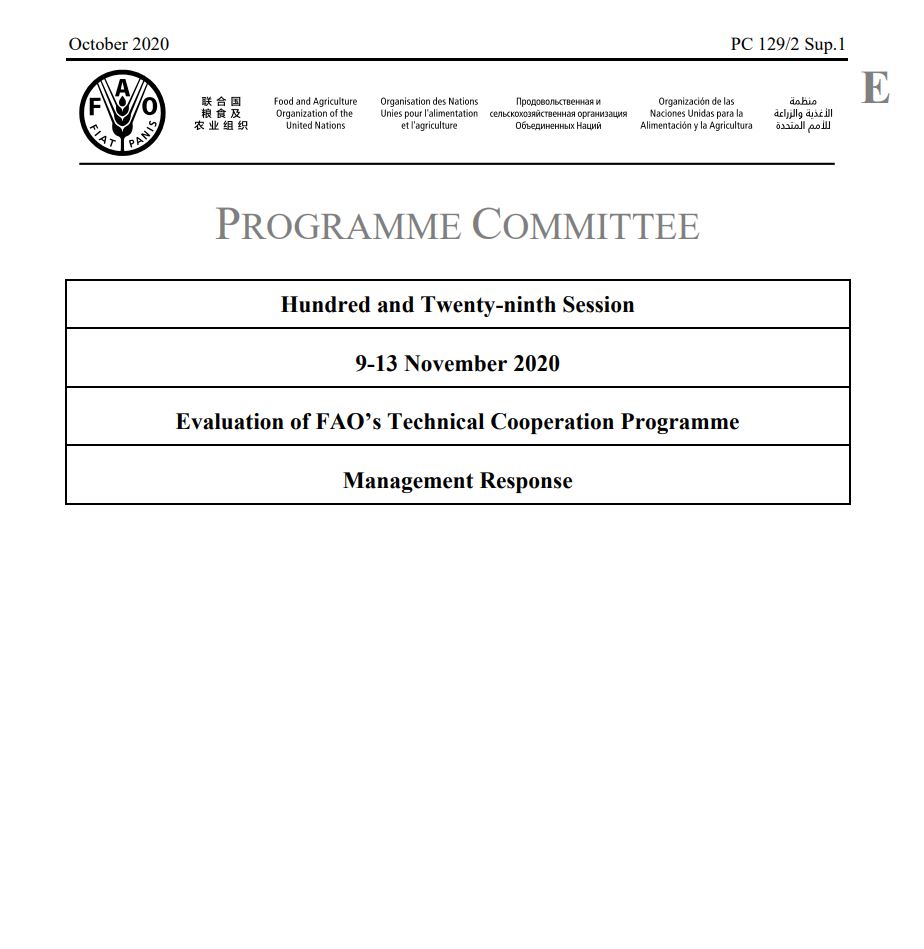
Management Response
09/11/2020
Management welcomes the Evaluation of FAO’s Technical Cooperation Programme (TCP). In particular, Management is pleased to see that the Evaluation confirmed the value of TCP as a vital instrument to support Members in addressing their priority needs, and the emphasis, throughout the report, on the strategic and catalytic use and effect of TCP resources...
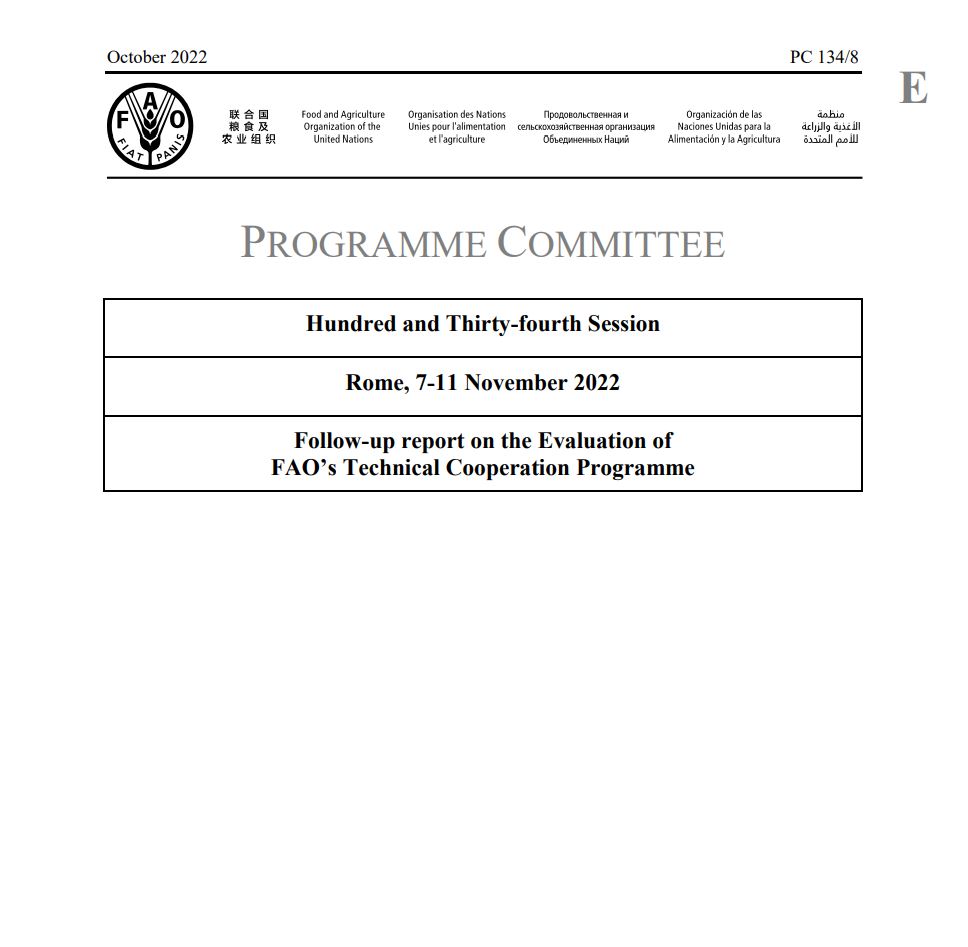
Follow-up report on the Evaluation
22/11/2022
The recommendations of the Evaluation of the Technical Cooperation Programme (TCP) were welcomed by Management and acted upon in close consultation with Members through the TCP Strategic Exercise.

